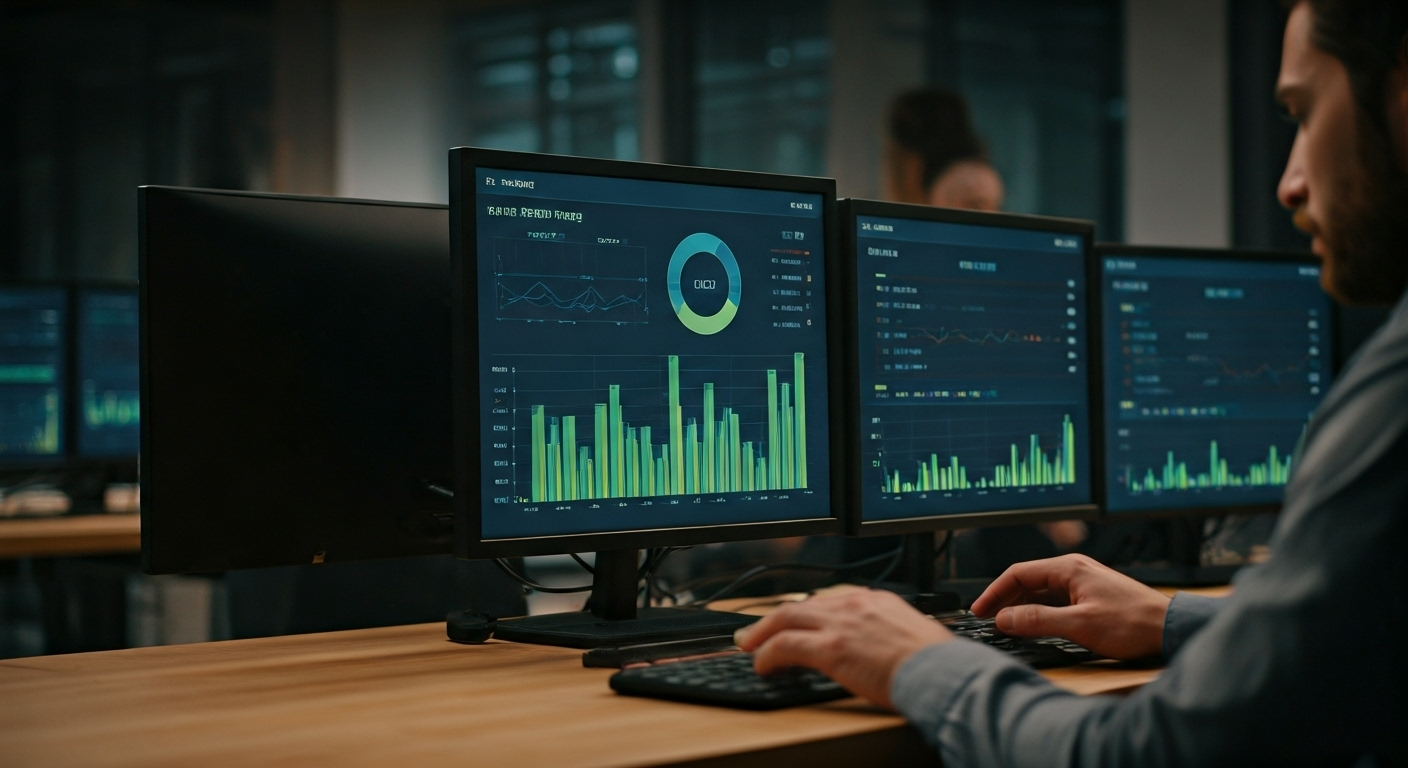Your Guide to Effective Energy Data Management
Your Guide to Effective Energy Data Management
Complete Handbook for Managing Energy Data Solutions
What is energy data management and why is it important?
Energy
data management involves the systematic collection, analysis, and reporting of energy consumption data to optimize efficiency and reduce costs. It's essential for organizations aiming to enhance sustainability, comply with regulations, and make informed decisions about energy use. Effective management can lead to significant financial and environmental benefits.

Key Highlights
- Energy Data Management enables the systematic collection, analysis, and interpretation of energy data to optimise energy usage and reduce costs effectively.
- By leveraging advanced analytics, businesses can achieve better operational efficiency and support sustainability initiatives.
- EDM solutions significantly impact a company’s bottom line by streamlining workflows and enhancing resource utilisation.
- Facilitates regulatory compliance through transparent energy reporting and adherence to environmental standards.
- Promotes informed decision-making concerning energy consumption, fostering long-term cost reductions and operational improvements.
Up next, explore the principles surrounding energy data management and its solutions.
Introduction
Energy data management is important in the world today. It helps people have better control of energy consumption and helps businesses work more efficiently. When you use energy data in the right way, you turn it into useful information. This helps people and companies make better choices. The way we manage this data can help control energy usage. It also cuts down on waste so you spend less money. This means that your business can reach high operational efficiency and cost reduction at the same time. When businesses focus on energy data management, they set themselves up to do well for years to come. They use new tools and ideas that match their energy usage with their goals for sustainability.
Understanding Energy Data Management Solutions

Energy data management solutions are changing the energy industry. These systems look at energy data, so companies can make better decisions. They use new technologies to handle the way energy needs keep changing for many businesses today.
When you follow best practices like real-time monitoring and easy reporting, your company can find where energy is being wasted. This also helps make better use of energy. By using good data management solutions for energy, businesses get the chance to lower their energy costs. They also help build day-to-day operations that are better for the environment and fit with rules.
Defining Energy Data Management and Its Core Functions
Energy data management is about the careful gathering, checking, and understanding of energy data. With this in place, a business can see how it uses energy every day. This can help them find ways for cost reduction by using less energy.
At the heart of good energy management, you find energy data management. Its main job is to give the kind of information that people can use to make better choices. For example, the use of analytics can find patterns in energy usage. These tools help a company handle energy prices and set up budgets, so they spend less.
Also, using strong energy systems like cloud tools lets people watch and store lots of energy data in real time. This keeps work fast and easy. By looking for problems in the data, companies can find better ways to use energy in their workflows. This helps them save resources and lower their impact on the environment.
Key Differences Between Energy Management and Energy Data Management
Energy management and energy data management are interconnected but distinct concepts. Their differences are outlined in the table below:
| Aspect | Energy Management | Energy Data Management |
|---|---|---|
| Primary Focus | Proactively optimizing energy consumption | Systematic collection and interpretation of energy usage data |
| Key Activity | Implementing strategies to reduce energy costs and enhance sustainability | Analyzing data for informed decision-making |
| Usage | Management systems for achieving regulatory compliance | Utilizing tools like cloud-based analytics systems |
| Application | Actions toward energy efficiency and regulatory goals | Insights for cost reduction and sustainability |
While the former involves direct actions to steer energy usage, the latter offers structured tools to guide those actions based on energy analytics. Together, they create a comprehensive energy optimization framework.
Importance of Energy Data Management in Modern Businesses

Energy data management helps companies run well and still be profitable. By looking at energy data, people can see how much power they use. This lets them find ways to spend less, which saves money on energy costs.
These systems also help the environment. They monitor energy use so companies can cut down on greenhouse gas emissions. This helps with sustainability efforts and makes it easier to follow the rules.
In today’s world, using good data management systems means lower energy costs, better rule-following, and stronger sustainability. All of this has a significant impact on how a business runs and its bottom line.
Enhancing Operational Efficiency and Cost Savings
Focusing on operational efficiency can have a big effect on energy costs. That is why energy data management is very important for any business. Systematic monitoring helps cut costs by showing where to save.
- Optimized Equipment Performance: Predictive analytics help find problems in machinery so you can use energy better.
- Energy Usage Insights: Data makes everything more clear and shows when use is highest, so you can make smarter workflows for operations.
- Process Adaptation: The business can use these insights to make stronger energy-saving plans.
- Cost Reduction: When you work more efficiently, it leads to real savings for your company, helping the budget.
Real-time tracking lets you quickly notice problems and fix energy use. This helps you save money and use power in a smart way. Over time, energy data management becomes a key part of how businesses work every day.
Supporting Regulatory Compliance and Sustainability Goals
Committing to energy data systems helps businesses meet rules and work for a better future at the same time. This is good if you want to make lasting changes in your company.
- Ensuring Transparency: When data is accurate, it helps make good plans for compliance. This means less risk of getting fines.
- Supporting Sustainability: With real-time checking, organisations are able to lower emissions. This helps them keep up with green standards and work better for the planet.
- Adopting Best Practices: Companies that use energy data management can build smarter energy setups. This is good for their plans and goals.
- Contributing to Long-Term Goals: When work is honest and open, it helps grow the business over many years.
If you use energy data, day-to-day management gets better. These solutions help not just with regulatory compliance, but they also let businesses use the best practices for the environment. Now, these things are important to people and to the new market expectations for sustainability and transparency.
Essential Features of Effective Energy Data Management Systems
Good energy data management systems help you use less energy in your business. They have important features like real-time data collection, good analytics, and easy-to-read reports. These give companies the right tools to track how they use energy.
A strong EDM system works well by using analytics to help reach key energy efficiency goals. These features make energy data systems a central aspect of energy management. With them, businesses can look at their energy data, spot trends, and find ways to make changes that have real effects. All this helps your work flow better and brings down costs.
Real-Time Data Collection and Integration Capabilities
Real-time data collection plays a big part in how businesses manage energy. By using systematic collection with sensors and integration tools, businesses can watch their energy consumption all the time.
This does more than just gather data. It makes real-time integration with workflows possible, so businesses can act fast. If energy consumption goes up during peak times or there is a problem with equipment, the system flags it right away. This way, businesses can change their plans or fix issues without having to wait.
Connecting these insights with tools that predict future needs also helps businesses plan ahead and use resources better. Real-time systems are key in making energy operations more accurate and effective.
Advanced Analytics and Reporting Functions
Analytics and reporting help make energy data management systems more useful. They help you use energy in the best way and bring more transparency for everyone.
- Efficiency Monitoring: Advanced analytics show where waste happens, so you can fix it fast.
- Optimisation Strategies: Detailed reports share tips on saving energy that fit with your company’s workflows.
- Enhanced Transparency: Real-time dashboards let you and your team see energy consumption and spot trends.
- Aligning Goals with Data: The reports make it easy to tie daily work to bigger sustainability goals.
If you do not use advanced analytics tools, you could lose out on ways to make things run smoother. Reporting can also connect the different types of energy data into easy-to-follow advice. This helps your team improve how they work and have more impact by using accurate information.
Conclusion
To sum up, using energy data management is not just a passing thing. It is needed for all businesses that want better operational efficiency and more sustainability. With the right systems, you can use energy data for real-time tracking and good analytics. This helps you get insights that lead to better choices and cost savings. On top of this, these tools help with following rules and also make your sustainability efforts stronger. If you are thinking about the ways energy data management can change the way you work, now is a good time to look into it. If you want to get the most out of how you handle your energy, you can ask for a free talk to help you get started. This first step will help you go forward with more efficiency and sustainability.
Frequently Asked Questions
What industries benefit most from energy data management solutions?
Industries like manufacturing, transportation, retail, and energy utilities get a lot of help from energy data management solutions. By using energy data to make energy consumption better and to improve workflows, these industries can get more work done in less time. They can also lower energy costs and follow rules more easily. This way, their work becomes better for all who are part of it.
How does energy data management improve sustainability efforts?
Energy data management helps with sustainability. It uses analytics to point out differences in energy usage. This lets organizations see where they can use less energy. They make changes with the information they get, and that cuts down on carbon footprints and greenhouse gas emissions. When they use less energy, it helps lower overall energy costs, too.
Is energy data management software customizable for different business sizes?
Yes, energy data management software can be changed to fit what different businesses need. It works for both small and large companies. The software lets you set up features that help you find ways to use less energy and be more efficient. You can also use it to help run your daily workflows better, no matter how big your group is.
What are the main challenges when implementing an energy data management system?
There are a few challenges. These include making sure that workflows match the new system. It is also important to keep regulatory compliance in mind. You have to look at the costs that come with making changes. Getting the technology to work well together is also needed. If you give time to plan for these things, it can help everyone use the system better. This will lead to good results and better productivity.
How do energy data management solutions help with regulatory compliance?
Energy data management helps you stay within the law. It does this by keeping track of your energy consumption and showing clear reports. This makes it easier for companies to follow the rules and avoid fines. With this, you can learn better ways to handle your energy in a smart and sustainable way. When you use energy data to guide you, you get closer to best practices and support sustainability.



